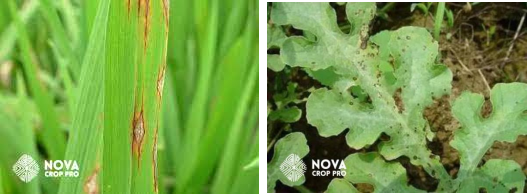Copper sulfate is an inorganic salt which is highly soluble in water. The copper ion is the component of copper sulfate with toxicological implications. Copper ions appear to bind to functional groups of protein molecules in fungi and algae and cause protein denaturation, resulting in cell damage and leakage.
Kasugamycin (Ksg) is an aminoglycoside antibiotic that inhibits the growth of bacteria by interfering with their ability to synthesise proteins. It is mainly used in agriculture to control fungal and bacterial diseases in various crops. Kasugamycin is active against the fungal pathogen Pyricularia oryzae, which causes rice blast, a major threat to rice production. It is also active against several species of bacteria, including Pseudomonas, Erwinia, Xanthomonas and Corynebacterium. Kasugamycin is also used to control diseases such as bean halo blight, sugar beet cercospora leaf spot and tomato leaf mould.
Product recommendation:
Copper sulfate pentahydrate 500 g/kg + Kasugamycin 40g/kg WP
Here are some of the advantages of this product:
Wider crop coverage: This fungicide can be used on artichokes, rice, asparagus, watermelon and pumpkins to control diseases such as soft rot, panicle blight, blast and Fusarium wilt.
Synergistic action: Copper sulfate pentahydrate, which denatures proteins and destroys cell walls, and kasugamycin, which inhibits protein biosynthesis, reducing bacterial growth and reproduction.
